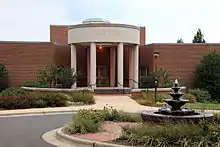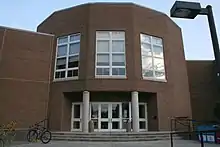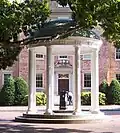University of North Carolina School of Law
The University of North Carolina School of Law, sometimes referred to as Carolina Law, is the law school of the University of North Carolina at Chapel Hill. Established in 1845, it is among the oldest law schools in the United States and is the oldest law school in North Carolina.
| University of North Carolina School of Law | |
|---|---|
 Van Hecke-Wettach Hall | |
| Parent school | University of North Carolina at Chapel Hill |
| Established | 1845 |
| School type | Public |
| Dean | Martin H. Brinkley |
| Location | Chapel Hill, North Carolina, United States 35°54′31.08633″N 79°2′32.73″W |
| USNWR ranking | 22nd (2023)[1] |
| Website | law |
History
19th century
On December 12, 1842, following discussion in the North Carolina legal community, the trustees of the University of North Carolina authorized the university's president David L. Swain to review and establish a law professorship. In 1845, William Horn Battle was named the first professor of law, and legal instruction began at the university.[2] In the years following, assistant professors and later an organized faculty and law library were added.
20th century
In 1915, Margaret Berry became the first female to graduate from the law school.[3] In the 1920s, the school began taking on much of the character of a modern law school, after the American Bar Association first published guidelines for schools. University President Harry Woodburn Chase was instrumental in leading the efforts for this reorganization over notable opposition, including the governor of North Carolina.[4]
In June 1951, Harvey Beech, J. Kenneth Lee, Floyd McKissick, and James Robert Walker Jr. became the first four black students enrolled at the law school. McKissick and other black students had argued in court that a state law school for blacks in Durham was not equal to that in Chapel Hill. In March 1951, a U.S. Court of Appeals agreed and ordered UNC to stop excluding black applicants.[5] Sylvia X. Allen became the first black female student to graduate in 1962, and did so as the mother of six children.[6]
As of 2017, the law school has 634 enrolled students and a student-faculty ratio of 11.3 to 1.[7] The entering class of first-year law students in 2017 was composed of 213 students from 25 states, the District of Columbia, and China. Sixty-three percent of students were from North Carolina, and students of color made up 26 percent of the class. Fifty-one percent of incoming students were female, while 49% were male.[8]
As of 2023, the University of North Carolina School of Law is ranked 22nd in the nation by U.S. News & World Report.[9]
Facilities

The law school is currently located in Van Hecke-Wettach Hall, towards the southeastern side of the Chapel Hill campus, neighboring the School of Government and several athletic facilities. Van Hecke-Wettach Hall includes the Kathrine R. Everett Law Library, located primarily on four floors on the back side of the building.
Centers and programs
The UNC School of Law is home to several centers that focus on issues of state and national interest:[10]
- Center for Banking and Finance - Lissa Broome, Director
- Center for Civil Rights - Theodore Shaw, Director.
- Center for Climate, Energy, Environment & Economics - Jonas J. Monast, Director
- North Carolina Coastal Resources Law, Planning and Policy Center
- UNC Center for Media Law and Policy - David Ardia, Co-Director
- Director Diversity Initiative
- Intellectual Property Initiative
- UNC School of Law Medical Child Abuse Initiative
- Prosecutors and Politics Project
- N.C. Poverty Research Fund
Clinics
Clinics provide students with the opportunity to learn legal theory and put the legal theory to practice.[11]
- Civil Legal Assistance Clinic
- Community Development Law Clinic
- Consumer Financial Transactions Clinic
- Domestic and Sexual Violence Clinic
- Immigration Clinic
- Intellectual Property Clinic
- Military and Veterans Law Clinic
- Youth Justice Clinic
Law journals
The school is home to six student-edited law journals.[12] The oldest, the North Carolina Law Review, was founded in 1922. This journal features an annual North Carolina issue reviewing developments in the state's law.
- First Amendment Law Review
- North Carolina Banking Institute Journal
- North Carolina Civil Rights Law Review
- North Carolina Journal of International Law
- North Carolina Journal of Law & Technology (NC JOLT)
- North Carolina Law Review
Employment
According to employment disclosures required by the American Bar Association, 92.46% of the class of 2020 obtained full-time, long-term, JD-required, JD advantage, or professional employment after graduation. A small number enrolled in further graduate studies.[13]
Costs
The total cost of attendance, including tuition, fees, and living expenses, at UNC for the 2017-2018 academic year was $49,562 for North Carolina residents and $66,193 for out-of-state students.[14] The Law School Transparency estimated debt-financed cost of attendance for three years is $176,368 for residents and $243,846 for nonresidents.[15]
Notable alumni
There are more than 10,000 alumni of the University of North Carolina School of Law since its founding.[16] Roughly 40 percent of practicing North Carolina attorneys are Carolina Law graduates, more than any other law school in North Carolina.[16] Many have gone on to notable roles, including government offices, such as former US Senator and 2004 Vice Presidential candidate John Edwards, and former Chief of Staff to the President of the United States and former US Congressman, Mick Mulvaney. Additionally, many have served in positions in the North Carolina state government. Among these are the current and recent North Carolina governors (Cooper, Hunt, Holshouser, Moore, and Sanford) and (as of the 2021 term) three of seven North Carolina Supreme Court justices (Barringer, Newby, and Hudson).
Leadership
- William Horn Battle, 1845-1868; 1877-1879 (as professor of law)
- Kemp Plummer Battle, 1879-1881 (as professor of law)
- John Manning Jr., 1881-1899 (as professor of law)
- James C. MacRae, 1899-1909 (as dean)
- Lucius Polk McGehee, 1910-1923 (as dean)
- Merton Leroy Ferson, 1924-1926
- Charles T. McCormick, 1927-1931
- Maurice Taylor Van Hecke, 1931-1941
- Robert Hasley Wettach, 1941-1949
- Henry Brandis Jr., 1949-1964[4]
- James Dickson Phillips Jr., 1964-1974
- Robert Gray Byrd, 1974-1979
- Kenneth S. Broun, 1979-1987[17]
- Judith Welch Wegner, 1989-1999
- Gene Nichol, 1999-2005
- John "Jack" Charles Boger, 2006-2015
- Martin H. Brinkley, 2015–Present[18]
References
- "University of North Carolina--Chapel Hill #22 in Best Law Schools". U.S. News & World Report L.P. Retrieved 13 May 2023.
- "History".
- "Women's History @ UNC". Archived from the original on 2013-02-03. Retrieved 2017-04-04.
- Coates, Albert, The Story of the Law School of the University of North Carolina, North Carolina Law Review 47, Oct. 1968 Special Issue
- "Carolina to Celebrate 50 Years of African-American Students".
- "Black History | CityView Magazine". April 21, 2021.
- "University of North Carolina--Chapel Hill". U.S. News & World Report. Retrieved 25 October 2017.
- "Class of 2020 Profile" (PDF). University of North Carolina School of Law. Retrieved 25 October 2017.
- "University of North Carolina--Chapel Hill #22 in Best Law Schools (tie)". U.S. News & World Report L.P. Retrieved 15 May 2023.
- "Centers and Programs". UNC School of Law.
- "UNC Law Clinics". UNC School of Law. Retrieved 21 June 2018.
- "UNC School of Law Journals". UNC School of Law.
- "ABA Required Disclosures". ABA Required Disclosures. Retrieved 15 September 2021.
- "Tuition and Fees 2021-2022".
- "University of North Carolina Profile".
- "Carolina Law Alumni Association".
- The University of North Carolina School of Law: A Sesquicentennial History, North Carolina Law Review 73.
- "Martin Brinkley '92 chosen as 14th Dean of UNC-Chapel Hill School of Law".
